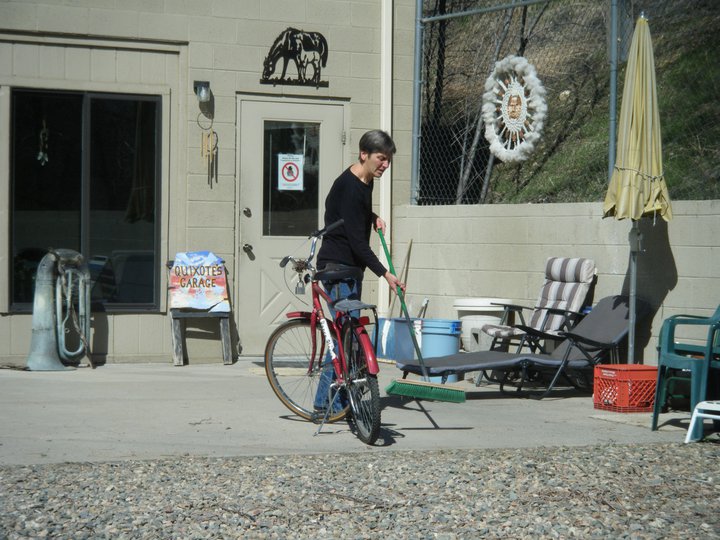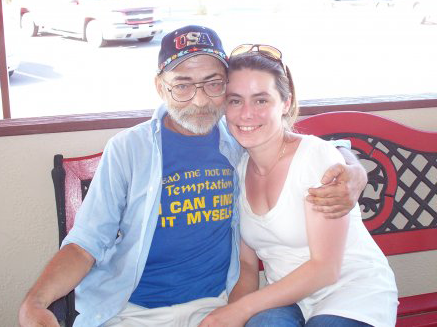Relax, have coffee, or just hang out with Kris and friends
at the Garage in Sam Hill Alley north of Willis.Open 8:30am – 2:00pm
Every day except Thursday
Since December, 2002, Quixote’s Garage has been a safe place for people to simply be—out of the weather and among friends; to relax, check the classifieds, use the phone, get mail, and have a cup of coffee. Loitering is allowed from 8:30am to 2pm every day except Thursday.
We are not an institution or organization. We do not provide programs or social services. We do not apply for grants or use any state or federal funds. We are supported solely by individuals who want to help us provide daytime hospitality to anyone who needs a safe place during the day.
Doug and Kris Finn founded the Garage. Unfortunately, Doug died in 2005, and Kris has continued the work, living in voluntary poverty and supported by donations from supporters and friends. She is open to finding a colleague in the work.
The hospitality that Kris and dedicated volunteers provide is in the Catholic Worker tradition. The Catholic Worker Movement was started by lay Catholics Dorothy Day and Peter Maurin in the 1930s. It continues today, made up of people committed to nonviolence, voluntary poverty, and hospitality for those who are homeless, hungry, exiled, or forsaken.
About Kris Finn
Learn more about the lovely Kris Finn, who runs the Garage. She is the heart of this project and one of the strongest people around.
Why this page was launched
This website has a cause. It’s a project straight from the heart, fueled by friends from across the Atlantic ocean.
About Don Quixote
A little background information on the name of this place.Don Quixote (/ˌdɒn kiːˈhoʊtiː/; Spanish: [ˈdoŋ kiˈxote]), fully titled The Ingenious Gentleman Don Quixote of La Mancha (Spanish: El ingenioso hidalgo don Quijote de la Mancha), is a Spanish novel by Miguel de Cervantes Saavedra. It follows the adventures of Alonso Quijano, an hidalgo who reads so many chivalric novels that he decides to set out to revive chivalry, under the name Don Quixote. He recruits a simple farmer, Sancho Panza, as his squire, who often employs a unique, earthly wit in dealing with Don Quixote’s rhetorical orations on antiquated knighthood. Don Quixote is met by the world as it is, initiating such themes as intertextuality, realism, metatheatre, and literary representation.
Published in two volumes, in 1605 and 1615, Don Quixote is considered the most influential work of literature from the Spanish Golden Age and the entire Spanish literary canon. As a founding work of modern Western literature, and one of the earliest canonical novels, it regularly appears high on lists of the greatest works of fiction ever published. It has had major influence on the literary community, as evidenced by direct references in Alexandre Dumas’ The Three Musketeers (1844) and Mark Twain’s The Adventures of Huckleberry Finn (1884). In a 2002 list, Don Quixote was cited as the “best literary work ever written”.

[…]
From shepherds to tavern-owners and inn-keepers, the characterization in Don Quixote was groundbreaking. The character of Don Quixote became so well known in its time that the word quixotic was quickly adopted by many languages. Characters such as Sancho Panza and Don Quixote’s steed, Rocinante, are emblems of Western literary culture. The phrase “tilting at windmills” to describe an act of attacking imaginary enemies derives from an iconic scene in the book.
Source: Wikipedia


